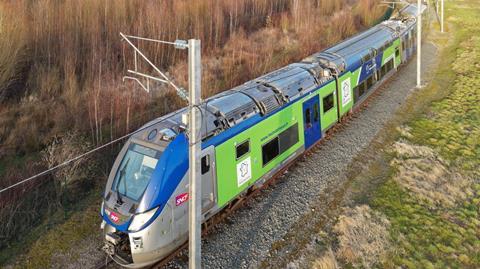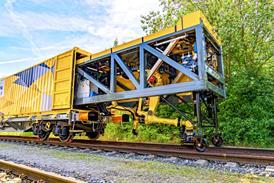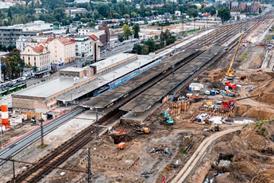
FRANCE: Test running with an automated train in attended ATO mode is underway in northern France as the latest phase of a pan-industry programme to develop autonomous trains for regional passenger services.
The technology is being developed by a consortium established by national railway operator SNCF which brings together Alstom, Bosch, Spirops, Thales and the Railenium technology research institute. The ultimate objective of the project is to achieve fully automatic operation by 2023.
The trial runs being undertaken between Aulnoye, Busigny and Calais with a modified Regio 2N double-deck electric multiple-unit during the week of May 17-21 involve ‘semi-autonomous’ operation to Grade of Automation 2. The train is able to accelerate and brake automatically under the supervision of a driver, detecting and responding to the aspects being displayed by lineside signals.
The Regio 2N trainset was modified at Alstom’s former Bombardier plant in Crespin earlier this year, with the fitting of sensors including video cameras, radar and lidar for data collection.
This was followed in early March by trial runs over the routes from Busigny to Aulnoye and Calais to test the satellite-based geolocation system and check the ability of the train to detect and recognise signals. During this phase, the prototype was operated conventionally by an SNCF driver, with the onboard systems operating in shadow mode.
The train was then transferred to the CEF test centre at Petite-Forêt, in order to test the acceleration and braking when running in automated mode. The second series of trials on the national network is intended to fine-tune the operating system and demonstrate the safety of the technology.
The trials were authorised by national rail safety authority EPSF, which is acting as an observer within the project in order to assess the technologies being developed. As well as considering how autonomous operation could impact on the railway in future, EPSF will also consider whether any regulatory changes may be required.
The project partners are also working closely with national cybersecurity authority ANSSI.
Commercial service
The partners envisage that the modified Regio 2N prototype will now alternate between commercial service and test running over the next two years. Further trials will be undertaken on the Aulnoye – Busigny route during school holiday periods, but at other times the train is expected to operate in regular traffic.
While carrying passengers, the train will be driven conventionally, but the onboard systems will continue to record data that can be used to improve the performance of the signal recognition algorithms.
Meanwhile, further laboratory work and simulation will be undertaken by the consortium partners to fine-tune the traction and braking performance of the control systems and further develop the automation technology.
‘Our project has passed a significant milestone with great success’, said SNCF’s Director of Technology, Innovation & Group Projects, Pierre Izard. ‘Another step has been taken towards achieving autonomy in rail. The mobilisation of the SNCF teams and our partners allows us to explore all the issues, both human and technological. With our research work and trials, we are making progress in the rail sector and preparing for its future development.’
‘The trials conducted over the last few months represent a significant step’, added Railenium CEO Eric Tregoat, noting that the institute had contributed its expertise ‘in the domains of artificial intelligence, BIM (digital mock-up), digital modelling and operating safety’.

















